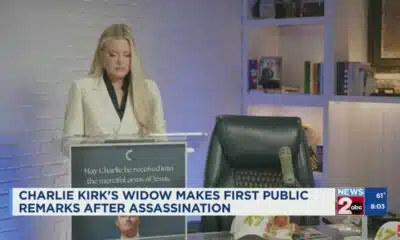News from the South - Texas News Feed
Texas hemp farmers frustrated with impending THC ban
“THC ban will destroy Texas’ hemp agriculture industry, farmers say” was first published by The Texas Tribune, a nonprofit, nonpartisan media organization that informs Texans — and engages with them — about public policy, politics, government and statewide issues.
Sign up for The Brief, The Texas Tribune’s daily newsletter that keeps readers up to speed on the most essential Texas news.
LUBBOCK — Six years ago, Texas lawmakers opened a door to a new lifeline for farmers: growing hemp. Farmers invested time, money and land into growing the drought-resistant crop and developing the state’s budding hemp industry.
The same lawmakers are now slamming the door shut. All products containing tetrahydrocannabinol, or THC, could soon be banned in Texas. As a result, farmers are bracing for impact as they wait to go out of business.
“We wouldn’t be in the hemp business in a million years if they hadn’t passed that bill,” said Ann Gauger, co-owner of Caprock Family Farms in Lubbock. “Now we’re one of the largest hemp producers in the U.S., and their ban is going to shut that down.”
The Texas hemp industry, in its current form, has effectively been handed a death sentence with the upcoming passage of Senate Bill 3, authored by Lubbock Republican Sen. Charles Perry. On Sunday, the Legislature sent the bill, which bans consumable hemp products that contain even trace amounts of THC, to Gov. Greg Abbott‘s desk. However, hemp can’t be produced without traces of THC, farmers say, regardless of the product.
The plant has been a target for lawmakers since the start of the legislative session, with the charge led by Lt. Gov. Dan Patrick. Patrick pulled out all the stops to make the ban pass, including with surprise visits to dispensaries in Austin and vows for a special session if it failed. Patrick and Perry say the hemp industry exploited a loophole in the bill that did not establish a threshold for hemp derivatives, other than delta-9 THC.
Texas Agriculture Commissioner Sid Miller has also walked back his opposition to an outright ban on THC, now aligning with Patrick’s position. He deleted a post on X where he called the THC ban a “sledgehammer” to farmers, and now Miller said the bill will not be detrimental to farmers. Miller said the hemp industry will thrive as it’s moving toward producing industrial hemp, a fiber type of hemp that does not contain THC. It could be used in construction materials, rope and more. He said they never intended to have THC available across Texas, and called it a dangerous situation.
/https://static.texastribune.org/media/files/fd7954150d0208945870f0e7f67acbe8/0523%20THC%20Farmers%20AR%2016.jpg)
/https://static.texastribune.org/media/files/ee44c75332f1fe618663d653ca22d7b7/0523%20THC%20Farmers%20AR%2001.jpg)
/https://static.texastribune.org/media/files/45807504dcdedeb48f3b43334cfb5e87/0523%20THC%20Farmers%20AR%2014.jpg)
“This just puts us back to where we started,” Miller told The Texas Tribune. “It’s going to be detrimental to a lot of businesses that have opened their business model on selling THC products. Those businesses will have to shut.”
In lawmakers’ pursuit of a ban, growers like Gauger were caught in the crosshairs. Gauger, who runs the business with her husband and two sons, felt ignored by most of the Legislaturestate leaders. Gauger says they did everything they could to get lawmakers to hear them over the last few months and testified to the House committee overseeing the bill. It did not work.
“Charles Perry says he has an open door policy. That is an absolute lie,” Gauger said. “We live in his district, and he will not see us. We’ve gone to his office in Austin, but he refuses to see us.”
Gauger said House Speaker Dustin Burrows, R-Lubbock, and his team were the only ones to speak with the family. Kyle Bingham is another frustrated hemp grower in the South Plains that took a chance on growing the crop. Bingham, who is also president of the Texas Hemp Growers Association, called the bill overreaching and unenforceable. He also said lawmakers involved in writing the bill ignored farmers during the process. Bingham is one of Perry’s constituents.
“We were left out of this conversation,” Bingham said. “Yes, you can go to public hearings, but not having a lot of say and being stonewalled out of the initial bills was frustrating.”
Throughout the session, Patrick has rallied against THC products, saying the products put children in danger. Gauger acknowledges there are bad actors in the industry, but says the bill will have a ripple effect. The industry also includes manufacturers, hemp processors, and people to run extractors.
“Throw the low lifes in jail if you want to stop the bad actors,” Gauger said. “But don’t take out the American farmers. Don’t take out the ag producers.”
Under the legislation, adults would face up to a year in jail for possessing hemp products with any amount of THC in it. This has put a stop to all of Gauger’s plans — the family farm was set to plant a large project that would produce 20 million pounds of CBD biomass. Since CBD is produced from hemp seeds, Gauger is worried she would be breaking the law. It wouldn’t be ready for harvest until October, a month after the law goes into effect.
/https://static.texastribune.org/media/files/55079b2c14d085f77896020e010eff03/0523%20THC%20Farmers%20AR%2018.jpg)
/https://static.texastribune.org/media/files/6f17ee37456695a77eae1469816e636d/0523%20THC%20Farmers%20AR%2021.jpg)
/https://static.texastribune.org/media/files/f62e33fd2648a34f927eae63ca347d35/0523%20THC%20Farmers%20AR%2019.jpg)
“We would be felons if we planted that,” Gauger said. “The land’s already been prepped, herbicides already put out. Once you do that, you can’t plant anything else on that land for the season.”
Bingham is in a similar position. He uses about 5% of his 2,000-acre farm for hemp, but he saw it as a good alternative in the drought-ridden region. Now, he says he has to walk away from his investment if it’s illegal to possess any detectable amounts of THC in the field.
“At this point, they’re threatening a felony so I’m out,” Bingham said. “I’m not risking a felony over this, and I think most farmers in Texas will stop growing too.”
Bingham said he’s now considering what to do in September when the bill is slated to go into effect. Any products he still has with THC will either have to be sold by then or he will be burning it. He’s going to focus more on cotton and wheat, even though he wanted hemp to be in their rotation of crops.
Gauger is expecting a downfall for the hemp industry across Texas. Just like growers have to consider the legal consequences, the same applies for retailers and grocery stores that sell consumable hemp products. This includes hemp hearts, hemp seed oil, and even some big brands — KIND bars have a line of granola bars that contain hemp seeds.
Perry’s team did not respond to a request to comment.
First round of TribFest speakers announced! Pulitzer Prize-winning columnist Maureen Dowd; U.S. Rep. Tony Gonzales, R-San Antonio; Fort Worth Mayor Mattie Parker; U.S. Sen. Adam Schiff, D-California; and U.S. Rep. Jasmine Crockett, D-Dallas are taking the stage Nov. 13–15 in Austin. Get your tickets today!
This article originally appeared in The Texas Tribune at https://www.texastribune.org/2025/05/26/texas-hemp-thc-ban-farmer/.
The Texas Tribune is a member-supported, nonpartisan newsroom informing and engaging Texans on state politics and policy. Learn more at texastribune.org.
The post Texas hemp farmers frustrated with impending THC ban appeared first on feeds.texastribune.org
Note: The following A.I. based commentary is not part of the original article, reproduced above, but is offered in the hopes that it will promote greater media literacy and critical thinking, by making any potential bias more visible to the reader –Staff Editor.
Political Bias Rating: Center-Left
This article primarily reports on the impact of Texas legislation banning THC-containing hemp products, highlighting the concerns of farmers and industry representatives affected by the bill. The tone emphasizes the economic and personal hardships faced by hemp growers and portrays lawmakers, particularly conservative Republicans, as dismissive or unresponsive to those impacted. While it presents statements from both sides, the framing and language show subtle sympathy toward the farmers and skepticism toward the legislative push led by Republican leaders. This positions the article slightly left of center, favoring the perspective of regulated industry stakeholders over strict prohibitionist policies.
News from the South - Texas News Feed
Austin becoming FEMA-approved emergency alert authority, planning 1st test alert
SUMMARY: On Monday, Sept. 29, Austin will conduct a test of the Integrated Public Alert and Warning System (IPAWS), becoming a FEMA-approved alerting authority able to send emergency alerts via Wireless Emergency Alerts (WEA) to cell phones and Emergency Alert System (EAS) messages to TV and radio. This coordinated test at 3 p.m. will cover the city across its three counties—Travis, Hays, and Williamson. The alerts will clearly indicate a test and require no action. IPAWS allows authenticated, geotargeted emergency notifications without subscription, enhancing public safety communication. More details are available at ReadyCentralTexas.org and Ready.gov/alerts.
The post Austin becoming FEMA-approved emergency alert authority, planning 1st test alert appeared first on www.kxan.com
News from the South - Texas News Feed
La Niña now expected to last all winter
SUMMARY: For the first time this year, La Niña is now forecast to last throughout the entire winter, with NOAA’s Climate Prediction Center giving it a 54% chance for December-February. Previously, ENSO Neutral was favored for winter. La Niña occurs when sea surface temperatures in the eastern equatorial Pacific are 0.5ºC below average, typically pushing the Pacific Jet Stream north, causing drier, warmer conditions in the southern U.S. and wetter areas in the Pacific Northwest. Last winter, a weak La Niña brought a record warm December but cooler January-February, below-average rainfall, snow in Austin, and more freezes than normal. Another mild La Niña winter is expected for Central Texas.
The post La Niña now expected to last all winter appeared first on www.kxan.com
News from the South - Texas News Feed
Texas high school football scores for Friday, Sept. 12
SUMMARY: Lake Travis dominated Midland Legacy 59-13 in a spirited farewell to the old Cavalier Stadium before renovations force home games to move to Dripping Springs High School. Across Central Texas, notable district wins included Anderson over College Station (37-14), Bowie against Glenn (38-14), and Dripping Springs edging Harker Heights (31-26). High-scoring games saw McNeil top Westwood 70-45, and Hutto defeat Cedar Ridge 63-49. Close contests included Vista Ridge’s 30-29 win over Round Rock and Austin LBJ’s 34-33 overtime victory against Wimberley. The article also features an extensive list of scores from other Texas high school football games.
The post Texas high school football scores for Friday, Sept. 12 appeared first on www.kxan.com
-
News from the South - North Carolina News Feed6 days ago
Reagan era credit pumps billions into North Carolina housing | North Carolina
-
News from the South - Alabama News Feed6 days ago
Amid opposition to Blount County medical waste facility, a mysterious Facebook page weighs in
-
News from the South - South Carolina News Feed6 days ago
South Carolina’s Tess Ferm Wins Miss America’s Teen 2026
-
News from the South - Kentucky News Feed6 days ago
3 states push to put the Ten Commandments back in school – banking on new guidance at the Supreme Court
-
News from the South - West Virginia News Feed5 days ago
Protesters in D.C. flood the streets demanding an end to Trump’s military deployment
-
Local News6 days ago
Duke University pilot project examining pros and cons of using artificial intelligence in college
-
News from the South - Missouri News Feed5 days ago
1587 Prime gives first look at food, cocktail menu ahead of grand opening in KC
-
News from the South - North Carolina News Feed7 days ago
Powerball surges to $1.8B ahead of Saturday's drawing











































